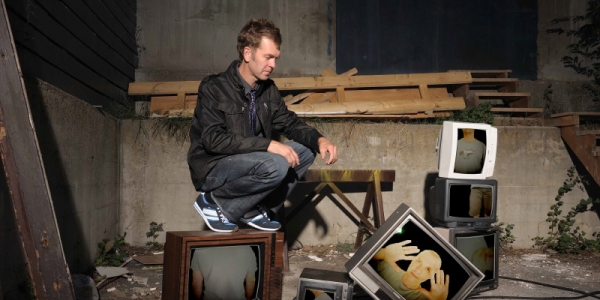Some people are averse to Enda Walsh’s verbosity and his loquaciousness, but I think it’s a challenge,” Brooks says. “I absolutely love performing it. Every line is perfect.” Verbosity is an understatement. Walsh’s dialogue is notoriously challenging, knotty, and filled with slang and digressions. “It’s funny, because I’ve watched interviews with him and he does not come across as so wordy in person!” he laughs. “Someone asked him about Penelope, and the interviewer had all these ideas about what the play was about, and he just said, ‘Nope, it’s about death!’”
The play itself takes place within an absurd, heightened reality, as four men – the last survivors from a group of hundreds – compete for the affection of a woman they can’t even see. “It’s amazing, the idea of these characters in a disgusting, fetid swimming pool,” Brooks says, “fighting over a woman they haven’t laid eyes on in 20 years, as she sits above, observing them through a camera. It’s like Big Brother meets Survivor meets American Idol. She doesn’t evict people, but the men self-evict by leaving or committing suicide. It’s a great juxtaposition of the stakes and the location.”
Brooks says that his character, Quinn, is the sociopathic alpha male of the group. “He’s from the business world, so I see him as a focused, savaged, greedy corporate man,” he says. “He’s come into this new world using the skills he’s built up in his old life. He’s very cold, and he gets rid of his rivals the same way he would cut staff. He has a corporate machine working, and it’s ultimately going to support him with the prize. The play’s about a lot of things, and people can make up their minds when they see it, but to me, it’s a comment on modern industrial corporate greed, and Quinn’s a really big part of that.”
The play requires all four men to be on stage at all times, and this has led to some quite intense bonding between Brooks and his fellow cast-mates. “It’s very intensive,” he says. “None of us can take a day off, because we all need to be here all the time.” This has been a learning experience. “We’re discovering how to be in the space when we don’t have lines,” he says. “It might not be your scene, but you’ll still be there. You can’t go offstage and prepare – you’re always there and involved in what’s going on, because you’re all stuck there in a swimming pool.”
Given the swimming pool setting, the play’s four central males perform entirely in speedos – aside from the obvious awkwardness of wearing such a revealing costume, Brooks tells me that this represents quite an acting challenge. “We’ve been rehearsing from day one in our speedos, because clothes give you a way out,” he says with a laugh. “I mean, think about it – when you wear clothes, you have pockets to put your hands in, and all kinds of things to distract you. When you’re performing in just your own skin, you have nowhere to hide – nowhere at all!”
I ask Brooks is he’s feeling self-conscious at all, and he admits that, while he regrets not hitting the gym a little harder, he’s happy to bare all. “The thing is, it’s all in the characters’ heads,” he says. “One of Quinn’s rivals is written as a washed-up old fat man, but the actor playing him doesn’t look like that at all – he doesn’t have an ounce of fat on him – but it still works, because it’s all in the mind. He’s so convinced he’s a fat man that he has this extreme body dysmorphia.”
This cuts both ways, and Brooks tells me that inhabiting the character of Quinn is simply a matter of confidence. “My character struts around like he’s a muscle-bound god, and I’m not like that at all, but all that matters is that the character believes it, and it works. There’s this hyper, heightened masculinity. Everything’s heightened – the language, the aggression. The pool is their little peacock parading ground, and these men parade around with this woman as the prize.”
A play set in a swimming pool represents a unique challenge in terms of creating sets, but Brooks tells me that Red Stitch Theatre Company are up to the challenge. “The guys are used to working miracles on a shoestring budget – they’re reusing old bits of sets, painting tiles, but the idea is that the pool is filled with 20 years’ worth of detritus, so they’re just cramming it with trash!”
BY ALASDAIR DUNCAN







